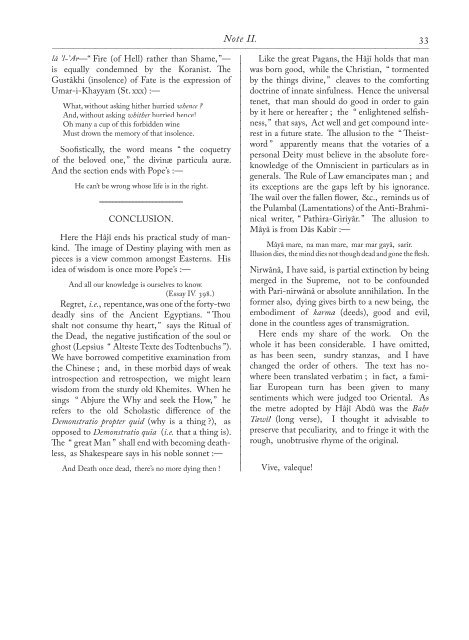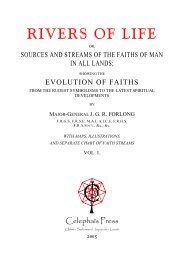Create successful ePaper yourself
Turn your PDF publications into a flip-book with our unique Google optimized e-Paper software.
Note II.<br />
——————————————————————————————————— 33<br />
lâ ’l-’Ar—“ ’l-’Ar Fire (of Hell) rather than Shame, ”—<br />
Like the great Pagans, the Hâjî holds that man<br />
is equally condemned by the Koranist. e was born good, while the Christian, “ tormented<br />
Gustâkhi (insolence) of Fate is the expression of by the things divine, ” cleaves to the comforting<br />
Umar-i-Khayyam (St. xxx) :—<br />
doctrine of innate sinfulness. Hence the universal<br />
What, without asking hither hurried whence ?<br />
And, without asking whither hurried hence!<br />
Oh many a cup of this forbidden wine<br />
tenet, that man should do good in order to gain<br />
by it here or hereafter ; the “ enlightened selfi shness,<br />
” that says, Act well and get compound inte-<br />
Must drown the memory of that insolence.<br />
rest in a future state. e allusion to the “ eist-<br />
Soofi stically, the word means “ the coquetry<br />
of the beloved one, ” the divinæ particula auræ.<br />
And the section ends with Pope’s :—<br />
word ” apparently means that the votaries of a<br />
personal Deity must believe in the absolute foreknowledge<br />
of the Omniscient in particulars as in<br />
generals. e Rule of Law emancipates man ; and<br />
He can’t be wrong whose life is in the right. its exceptions are the gaps left by his ignorance.<br />
=========================<br />
e wail over the fallen fl ower, &c., reminds us of<br />
the Pulambal (Lamentations) of the Anti-Brahmi-<br />
CONCLUSION.<br />
nical writer, “ Pathira-Giriyâr. ” e allusion to<br />
Mâyâ is from Dâs Kabîr :—<br />
Here the Hâjî ends his practical study of mankind.<br />
e image of Destiny playing with men as<br />
pieces is a view common amongst Easterns. His<br />
idea of wisdom is once more Pope’s :—<br />
And all our knowledge is ourselves to know.<br />
(Essay IV. 398.)<br />
Regret, i.e., repentance, was one of the forty-two<br />
deadly sins of the Ancient Egyptians. “ ou<br />
shalt not consume thy heart, ” says the Ritual of<br />
the Dead, the negative justifi cation of the soul or<br />
ghost (Lepsius “ Alteste Texte des Todtenbuchs ”).<br />
We have borrowed competitive examination from<br />
the Chinese ; and, in these morbid days of weak<br />
introspection and retrospection, we might learn<br />
wisdom from the sturdy old Khemites. When he<br />
sings “ Abjure the Why and seek the How, ” he<br />
refers to the old Scholastic diff erence of the<br />
Demonstratio propter quid (why is a thing ?), as<br />
opposed to Demonstratio quia ( i.e. that a thing is).<br />
e “ great Man ” shall end with becoming deathless,<br />
as Shakespeare says in his noble sonnet :—<br />
And Death once dead, there’s no more dying then !<br />
———————————————————————————————————————————————————<br />
Mâyâ mare, na man mare, mar mar gayâ, sarîr.<br />
Illusion dies, the mind dies not though dead and gone the fl esh.<br />
Nirwânâ, I have said, is partial extinction by being<br />
merged in the Supreme, not to be confounded<br />
with Pari-nirwânâ or absolute annihilation. In the<br />
former also, dying gives birth to a new being, the<br />
embodiment of karma (deeds), good and evil,<br />
done in the countless ages of transmigration.<br />
Here ends my share of the work. On the<br />
whole it has been considerable. I have omitted,<br />
as has been seen, sundry stanzas, and I have<br />
changed the order of others. e text has nowhere<br />
been translated verbatim ; in fact, a familiar<br />
European turn has been given to many<br />
sentiments which were judged too Oriental. As<br />
the metre adopted by Hâjî Abdû was the Bahr<br />
Tawîl (long verse), I thought it advisable to<br />
preserve that peculiarity, and to fringe it with the<br />
rough, unobtrusive rhyme of the original.<br />
Vive, valeque!






![[PDF] Prolegomena](https://img.yumpu.com/16774951/1/190x245/pdf-prolegomena.jpg?quality=85)










